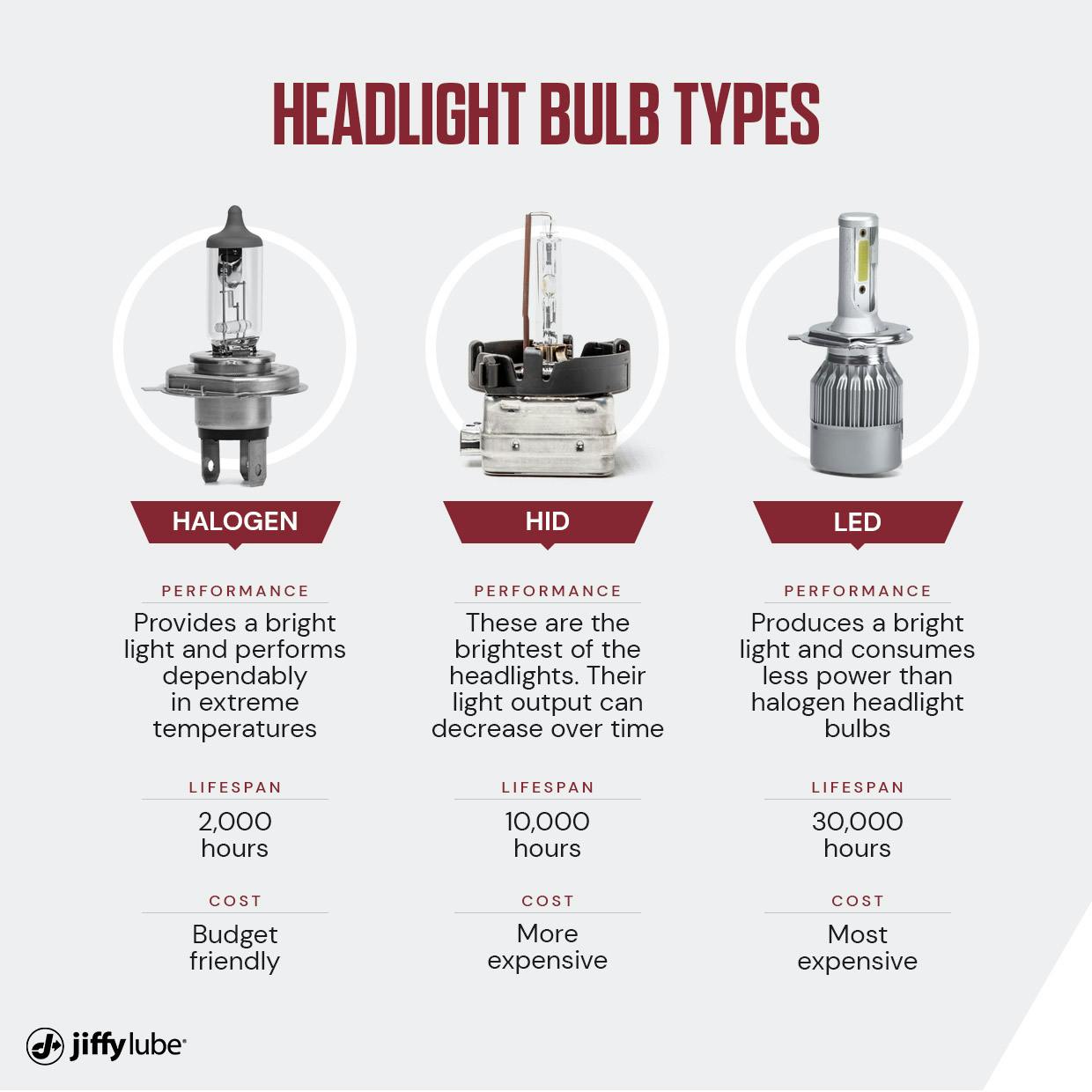Would you rather see or be seen? Ah ha! It’s a trick question, because when you’re on the road, they’re both equally important. Just as you want to see the road, pedestrians, and other vehicles, you want everyone to be able to see you, too. That’s why it’s essential to your safety that you understand the headlight bulb types currently available so you can select the one that provides the light you need.
Should you replace your headlight bulbs with ones that provide an extra-bright light? Are the bulbs with the lower price point a better deal than the ones that promise longer life? With all these headlight bulb types, how do you know which is the right option for you? The short answer: Car design generally dictates which of these headlight bulb types you should choose. Now, let’s take a closer look …
Types of Headlight Bulbs
When considering headlight bulbs, there are three common types: halogen, HID, and LED.
Halogen Headlights
Halogens use technology that’s been around for more than half a century, and their dependable performance has helped make them the standard among car manufacturers. They provide a bright light and perform dependably in extreme temperatures. Of all the different headlight bulbs, these are the easiest to find at replacement time. Their typical life expectancy is 2,000 hours of use.
HID Headlights
HID headlights — also known as Xenon High-Intensity Discharge headlights — are often the choice for cars with narrower headlight units. These are the brightest of all the different types of headlights available today. Their light output can decrease over time, and eventually, they won’t produce enough light to be safe for night driving. (By law, they must operate at 80% of capacity within four seconds of being switched on.) Still, HID bulbs last much longer than halogen bulbs. A typical life expectancy is 10,000 hours of use.

LED Headlights
Light Emitting Diode — or LED — lights are gaining popularity and have replaced Xenon headlights on many new cars. They produce a bright light, nearly as bright as Xenon bulbs, and consume less power than halogen headlight bulbs. They’re the longest-lasting bulb type, with a typical life expectancy of 30,000 hours.
With all those benefits, why not just switch headlight bulb types and go with LED lights? In many cases, an LED bulb won’t fit. They’re smaller than halogen bulbs and convert electricity into light differently. A conversion kit may be required along with the bulbs, which means additional money and time. If the electronics in an LED bulb fail, the entire light unit may have to be replaced. That makes LEDs impractical for older cars — at least for now! Technology is constantly evolving, and in the future, there may be LED bulbs that can be replaced separately.
What Type of Headlight Bulb Do You Need?
When selecting a headlight bulb, there are a few factors to consider.
- Vehicle compatibility: You should refer to your owner’s manual to determine which bulb best fits your vehicle’s make, model, and year. If you can’t locate your manual, or if it gives you multiple options, visit an automotive professional to find the proper specifications for your vehicle.
- Cost: Halogen headlights are the most budget-friendly option, while HID and LED headlights tend to be more expensive.
- Laws and regulations: Each state has its own laws governing headlights. For example, some jurisdictions consider HID lights too bright for driving.
- Installation: Halogen bulbs are usually easier to install, while HID and LED usually take more time and effort to install.
Bring Your Vehicle to Jiffy Lube for Headlight Service
With all the changes and innovations, it’s hard to stay up to date on headlight bulb types. That’s why you can make Jiffy Lube® your go-to for vehicle maintenance, including servicing and replacing the right headlights for your car, minivan, truck, or SUV.
Plus, with a Jiffy Lube Signature Service® Oil Change, our trained technicians will also inspect your vehicle’s:
- Fog lights
- Parking lights
- Taillights
- Backup lights
- Brake lights
- Turn signal lights
- License plate lights
NOTE: Not all services are offered at all Jiffy Lube service centers. Please call ahead or check jiffylube.com to ensure the service is available at the Jiffy Lube location near you.


